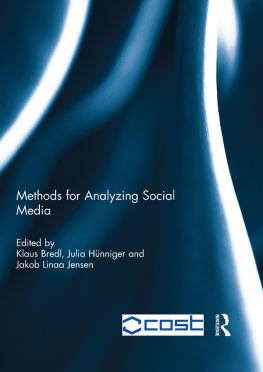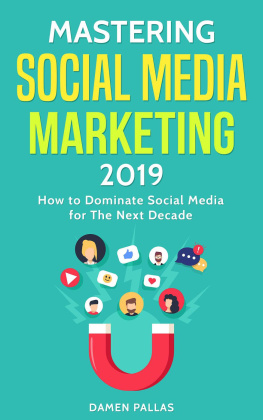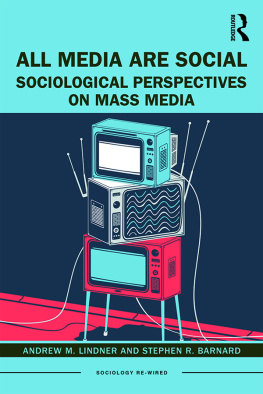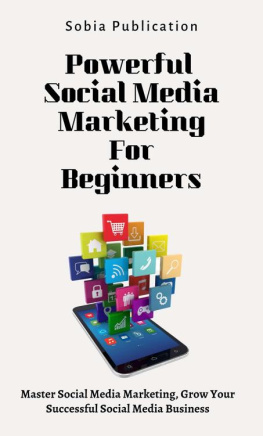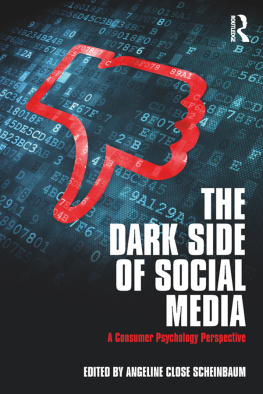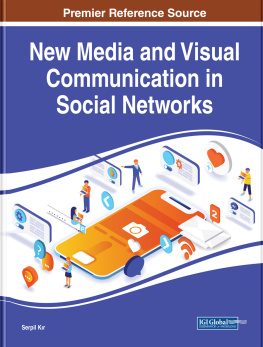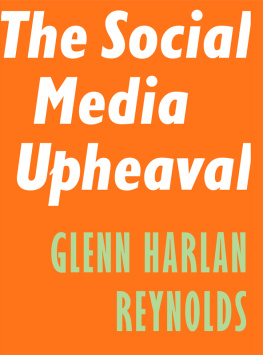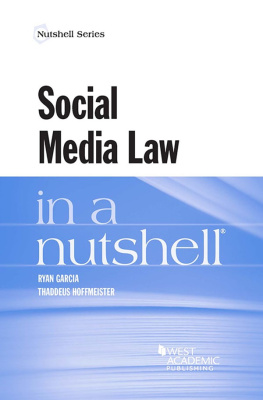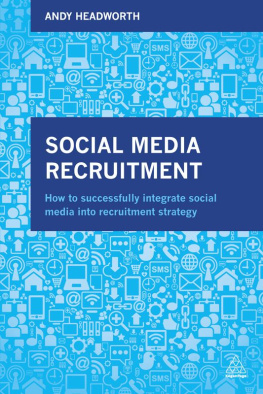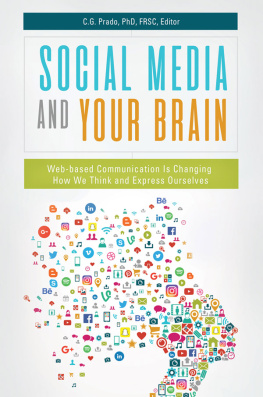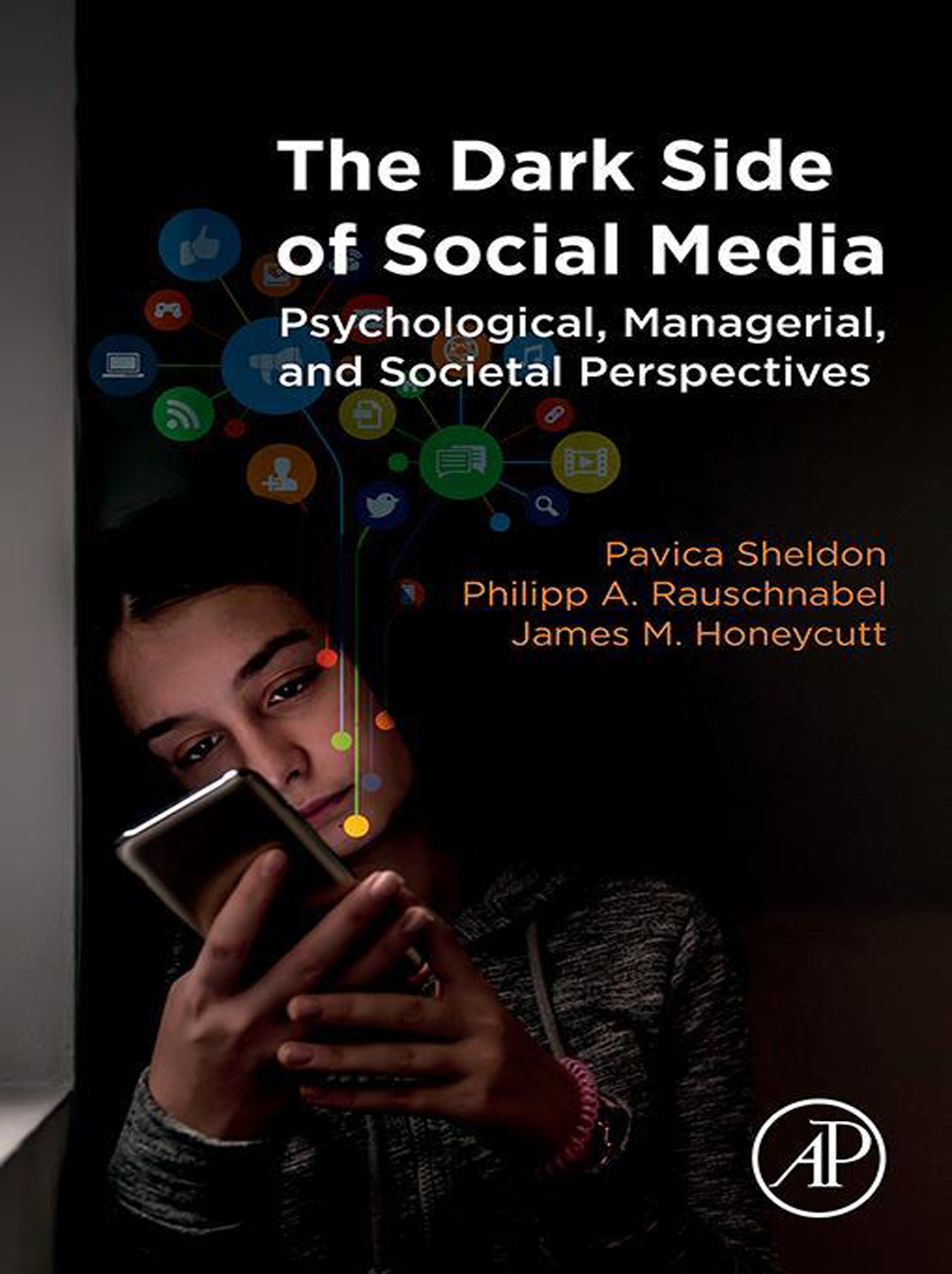Table of Contents
List of tables
- Tables in Chapter 2
- Tables in Chapter 3
- Tables in Chapter 4
- Tables in Chapter 6
- Tables in Chapter 7
List of illustrations
- Figures in Chapter 6
- Figures in Chapter 7
Landmarks
Table of Contents
The Dark Side of Social Media
Psychological, Managerial, and Societal Perspectives
Pavica Sheldon
Communications Arts Department, The University of Alabama in Huntsville, Huntsville, AL, United States
Philipp A. Rauschnabel
Fakultt fr Betriebswirtschaft (College of Business), Universitt der Bundeswehr Mnchen, Neubiberg, Germany
James M. Honeycutt
Organizational Behavior, Coaching, and Consulting, Naveen Jindal School of Management, The University of Texas at Dallas, Richardson, TX, United States

Copyright
Academic Press is an imprint of Elsevier
125 London Wall, London EC2Y 5AS, United Kingdom
525 B Street, Suite 1650, San Diego, CA 92101, United States
50 Hampshire Street, 5th Floor, Cambridge, MA 02139, United States
The Boulevard, Langford Lane, Kidlington, Oxford OX5 1GB, United Kingdom
Copyright 2019 Elsevier Inc. All rights reserved.
No part of this publication may be reproduced or transmitted in any form or by any means, electronic or mechanical, including photocopying, recording, or any information storage and retrieval system, without permission in writing from the publisher. Details on how to seek permission, further information about the Publishers permissions policies and our arrangements with organizations such as the Copyright Clearance Center and the Copyright Licensing Agency, can be found at our website: www.elsevier.com/permissions.
This book and the individual contributions contained in it are protected under copyright by the Publisher (other than as may be noted herein).
Notices
Knowledge and best practice in this field are constantly changing. As new research and experience broaden our understanding, changes in research methods, professional practices, or medical treatment may become necessary.
Practitioners and researchers must always rely on their own experience and knowledge in evaluating and using any information, methods, compounds, or experiments described herein. In using such information or methods they should be mindful of their own safety and the safety of others, including parties for whom they have a professional responsibility.
To the fullest extent of the law, neither the Publisher nor the authors, contributors, or editors, assume any liability for any injury and/or damage to persons or property as a matter of products liability, negligence or otherwise, or from any use or operation of any methods, products, instructions, or ideas contained in the material herein.
British Library Cataloguing-in-Publication Data
A catalogue record for this book is available from the British Library
Library of Congress Cataloging-in-Publication Data
A catalog record for this book is available from the Library of Congress
ISBN: 978-0-12-815917-0
For Information on all Academic Press publications visit our website at https://www.elsevier.com/books-and-journals
Publisher: Nikki Levy
Acquisition Editor: Joslyn Chaiprasert-Paguio
Editorial Project Manager: Barbara Makinster
Production Project Manager: Paul Prasad Chandramohan
Cover Designer: Mathew Limbert
Typeset by MPS Limited, Chennai, India

Dedication
I dedicate this book to those who are not addicted to social media. It is sad that social media addiction does not enhance cultural creativity and imaginationas opposed to simply playing entertainment games, which do not contribute to society. We need to move onward and upward, as I say.
James M. Honeycutt
I dedicate this book to my wife and daughter!
Philipp A. Rauschnabel
Preface
Social media influence the way we live our lives and conduct business. Scholars have discussed the use of social media to build personal and professional relationships, but little attention has been given to the negative aspects of social media. The purpose of this book is to complement the numerous empirical findings on the bright side of social media with a less bright perspective. The Dark Side of Social Media involves understanding what research has told us about social media influence on our personal, professional, and public lives and practices. This book is intended for scholars, college students, social media professionals, and members of the general public interested in the social sciencesincluding media psychology and addiction, interpersonal relationships, consumer behavior, journalism trends, and organizational communication. The book has additional applications in social work, educational psychology, and sociology.
, Social Media Lies and Rumors, explores lies and rumors that occur on social media. It includes a background on deception, as well as how rumors are spread on social media.
Acknowledgments
In terms of acknowledgments, I appreciate Pavica asking me to contribute to this book as a coauthor. I was her major professor, and now she is chair of the communications department at the University of Alabama in Huntsville. She continues my legacy.
James M. Honeycutt
I would like to acknowledge all of the students at the University of Alabama in Huntsville who have helped with this book, especially Latoya Tisdale Binford and Brittney Sykes.
Pavica Sheldon
I thank my co-authors Nadine Kammerlander and Bjrn S. Ivens for the great collaboration on our paper on social media firestorms (Rauschnabel, P. A., Kammerlander, N., & Ivens, B. S. (2016). Collaborative brand attacks in social media: Exploring the antecedents, characteristics, and consequences of a new form of brand crises. Journal of Marketing Theory and Practice, 24(4), 381410) which is the basis for chapter 7 in this book.
Philipp A. Rauschnabel
Section I
The Dark Side of Personal Social Media Use
Outline
Chapter 1
Social Media and Mental and Physical Health
Abstract
Have you ever been so glued to your phone or tablet that you forgot what time it is and, as a result, went to bed later than usual? Did you make a post on Facebook that received no likes or only negative comments? Have you ever felt uncomfortable because of the conflict that occurred because you or others posted private information on social media? The answer is probably yes, and the evidence suggests that social media technologies can influence both our mental and physical health.
While potential health benefits might include an increase in social support, social capital, and life satisfaction, negative consequences comprise social isolation, increased stress, anxiety, depression, disordered sleeping patterns, eating disorders, social media addiction, and attention deficit, among others.
This chapter reviews a number of studies examining the relationship between social media and mental and physical health. It discusses stress, depression, anxiety, mood, sleeping disorder patterns, and social media addiction. The chapter concludes with solutions to negative influences of social media on mental health.


